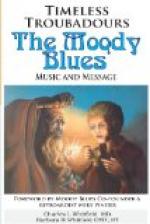The Monk of Montaudon, Peire Raimon of Toulouse, Uc de San Circ, Uc Brunet and other troubadours of less importance also enjoyed Alfonso’s patronage. Guiraut de Bornelh sent a poem to the Catalonian court in terms which seemed to show that the simple style of poetry was there preferred to complicated obscurities. The same troubadour was sufficiently familiar with Alfonso’s successor, Pedro II., to take part in a tenso with him.
Pedro II. (1196-1213) was no less popular with the troubadours than his [114] father. Aimeric de Pegulhan, though more closely connected with the court of Castile, is loud in his praises of Pedro, “the flower of courtesy, the green leaf of delight, the fruit of noble deeds.” Pedro supported his brother-in-law, Raimon VI. of Toulouse, against the crusaders and Simon de Montfort during the Albigeois crusade and was killed near Toulouse in the battle of Muret. The Chanson de la Croisade does not underestimate the impression made by his death.
Mot fo grans lo dampnatges e.l dols e.l
perdementz
Cant lo reis d’Arago remas mort
e sagnens,
E mot d’autres baros, don fo grans
l’aunimens
A tot crestianesme et a trastotas gens.
“Great was the damage and the grief and the loss when the King of Aragon remained dead and bleeding with many other barons, whence was great shame to all Christendom and to all people.”
The Court of Castile attracted the attention and the visits of the troubadours, chiefly during the reign of Alfonso VIII. (or III.; 1158-1214) the hero of Las Navas de Tolosa, the most decisive defeat which the Arab power in the West had sustained since the days of Charles Martel. The preceding defeat of Alfonso’s forces at Alarcos in 1195 had called forth a fine crusade sirventes from Folquet of Marseilles appealing to Christians in general and the King of Aragon in particular [115] to join forces against the infidels. The death of Alfonso’s son, Fernando, in 1211 from an illness contracted in the course of a campaign against the infidels was lamented by Guiraut de Calanso, a Gascon troubadour.
Lo larc e.l franc, lo valen e.l grazitz,
Don cuiavon qu’en fos esmendatz
Lo jove reys, e.n Richartz lo prezatz
E.l coms Jaufres, tug li trey valen fraire.




